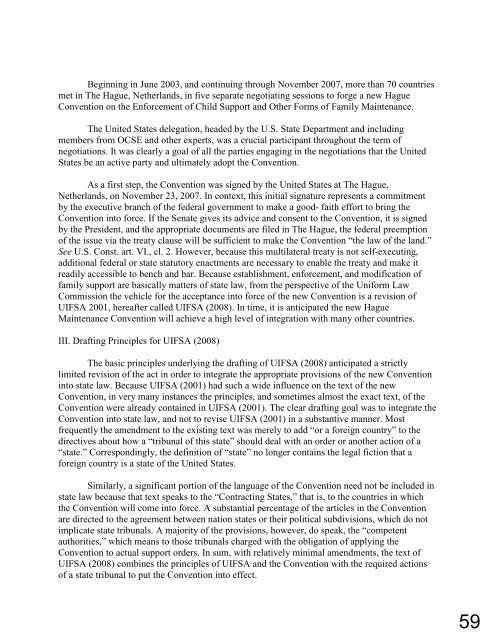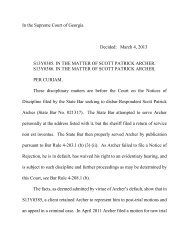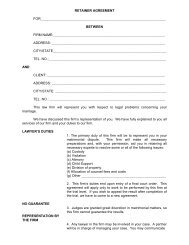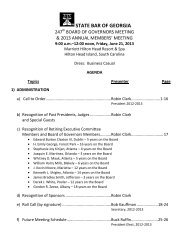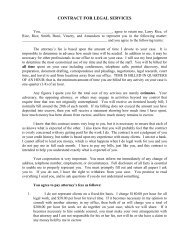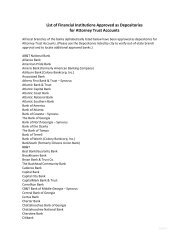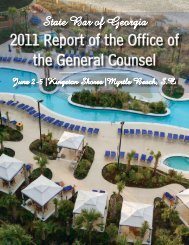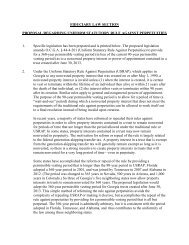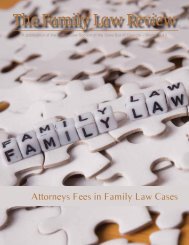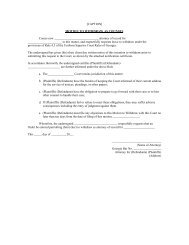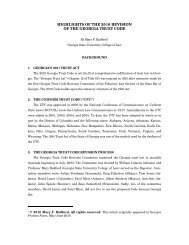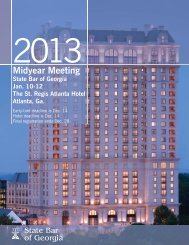2008 Amendments to the Uniform Interstate Family Support Act ...
2008 Amendments to the Uniform Interstate Family Support Act ...
2008 Amendments to the Uniform Interstate Family Support Act ...
You also want an ePaper? Increase the reach of your titles
YUMPU automatically turns print PDFs into web optimized ePapers that Google loves.
Beginning in June 2003, and continuing through November 2007, more than 70 countries<br />
met in The Hague, Ne<strong>the</strong>rlands, in five separate negotiating sessions <strong>to</strong> forge a new Hague<br />
Convention on <strong>the</strong> Enforcement of Child <strong>Support</strong> and O<strong>the</strong>r Forms of <strong>Family</strong> Maintenance.<br />
The United States delegation, headed by <strong>the</strong> U.S. State Department and including<br />
members from OCSE and o<strong>the</strong>r experts, was a crucial participant throughout <strong>the</strong> term of<br />
negotiations. It was clearly a goal of all <strong>the</strong> parties engaging in <strong>the</strong> negotiations that <strong>the</strong> United<br />
States be an active party and ultimately adopt <strong>the</strong> Convention.<br />
As a first step, <strong>the</strong> Convention was signed by <strong>the</strong> United States at The Hague,<br />
Ne<strong>the</strong>rlands, on November 23, 2007. In context, this initial signature represents a commitment<br />
by <strong>the</strong> executive branch of <strong>the</strong> federal government <strong>to</strong> make a good- faith effort <strong>to</strong> bring <strong>the</strong><br />
Convention in<strong>to</strong> force. If <strong>the</strong> Senate gives its advice and consent <strong>to</strong> <strong>the</strong> Convention, it is signed<br />
by <strong>the</strong> President, and <strong>the</strong> appropriate documents are filed in The Hague, <strong>the</strong> federal preemption<br />
of <strong>the</strong> issue via <strong>the</strong> treaty clause will be sufficient <strong>to</strong> make <strong>the</strong> Convention “<strong>the</strong> law of <strong>the</strong> land.”<br />
See U.S. Const. art. VI., cl. 2. However, because this multilateral treaty is not self-executing,<br />
additional federal or state statu<strong>to</strong>ry enactments are necessary <strong>to</strong> enable <strong>the</strong> treaty and make it<br />
readily accessible <strong>to</strong> bench and bar. Because establishment, enforcement, and modification of<br />
family support are basically matters of state law, from <strong>the</strong> perspective of <strong>the</strong> <strong>Uniform</strong> Law<br />
Commission <strong>the</strong> vehicle for <strong>the</strong> acceptance in<strong>to</strong> force of <strong>the</strong> new Convention is a revision of<br />
UIFSA 2001, hereafter called UIFSA (<strong>2008</strong>). In time, it is anticipated <strong>the</strong> new Hague<br />
Maintenance Convention will achieve a high level of integration with many o<strong>the</strong>r countries.<br />
III. Drafting Principles for UIFSA (<strong>2008</strong>)<br />
The basic principles underlying <strong>the</strong> drafting of UIFSA (<strong>2008</strong>) anticipated a strictly<br />
limited revision of <strong>the</strong> act in order <strong>to</strong> integrate <strong>the</strong> appropriate provisions of <strong>the</strong> new Convention<br />
in<strong>to</strong> state law. Because UIFSA (2001) had such a wide influence on <strong>the</strong> text of <strong>the</strong> new<br />
Convention, in very many instances <strong>the</strong> principles, and sometimes almost <strong>the</strong> exact text, of <strong>the</strong><br />
Convention were already contained in UIFSA (2001). The clear drafting goal was <strong>to</strong> integrate <strong>the</strong><br />
Convention in<strong>to</strong> state law, and not <strong>to</strong> revise UIFSA (2001) in a substantive manner. Most<br />
frequently <strong>the</strong> amendment <strong>to</strong> <strong>the</strong> existing text was merely <strong>to</strong> add “or a foreign country” <strong>to</strong> <strong>the</strong><br />
directives about how a “tribunal of this state” should deal with an order or ano<strong>the</strong>r action of a<br />
“state.” Correspondingly, <strong>the</strong> definition of “state” no longer contains <strong>the</strong> legal fiction that a<br />
foreign country is a state of <strong>the</strong> United States.<br />
Similarly, a significant portion of <strong>the</strong> language of <strong>the</strong> Convention need not be included in<br />
state law because that text speaks <strong>to</strong> <strong>the</strong> “Contracting States,” that is, <strong>to</strong> <strong>the</strong> countries in which<br />
<strong>the</strong> Convention will come in<strong>to</strong> force. A substantial percentage of <strong>the</strong> articles in <strong>the</strong> Convention<br />
are directed <strong>to</strong> <strong>the</strong> agreement between nation states or <strong>the</strong>ir political subdivisions, which do not<br />
implicate state tribunals. A majority of <strong>the</strong> provisions, however, do speak, <strong>the</strong> “competent<br />
authorities,” which means <strong>to</strong> those tribunals charged with <strong>the</strong> obligation of applying <strong>the</strong><br />
Convention <strong>to</strong> actual support orders. In sum, with relatively minimal amendments, <strong>the</strong> text of<br />
UIFSA (<strong>2008</strong>) combines <strong>the</strong> principles of UIFSA and <strong>the</strong> Convention with <strong>the</strong> required actions<br />
of a state tribunal <strong>to</strong> put <strong>the</strong> Convention in<strong>to</strong> effect.<br />
59


